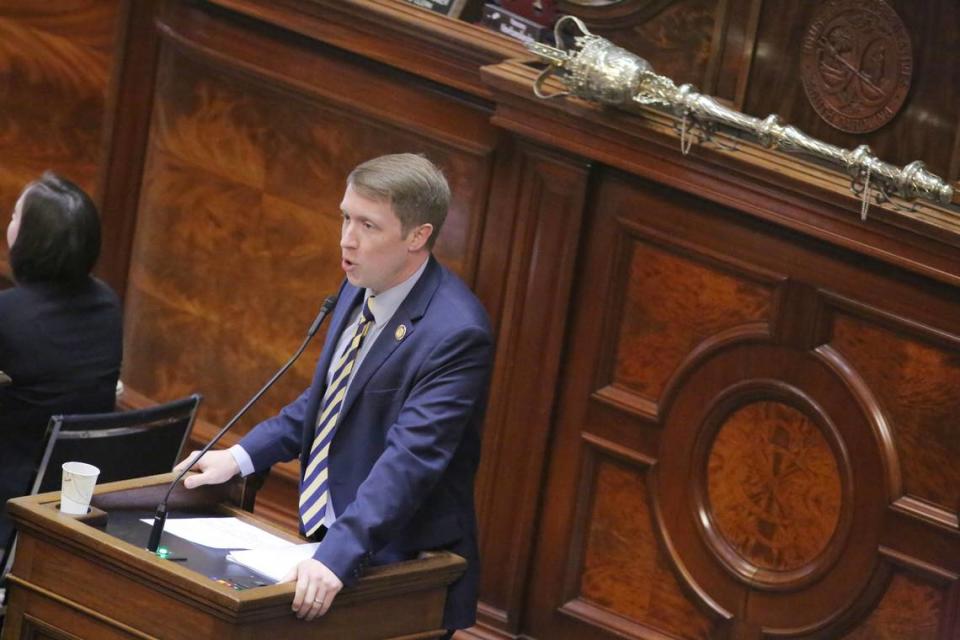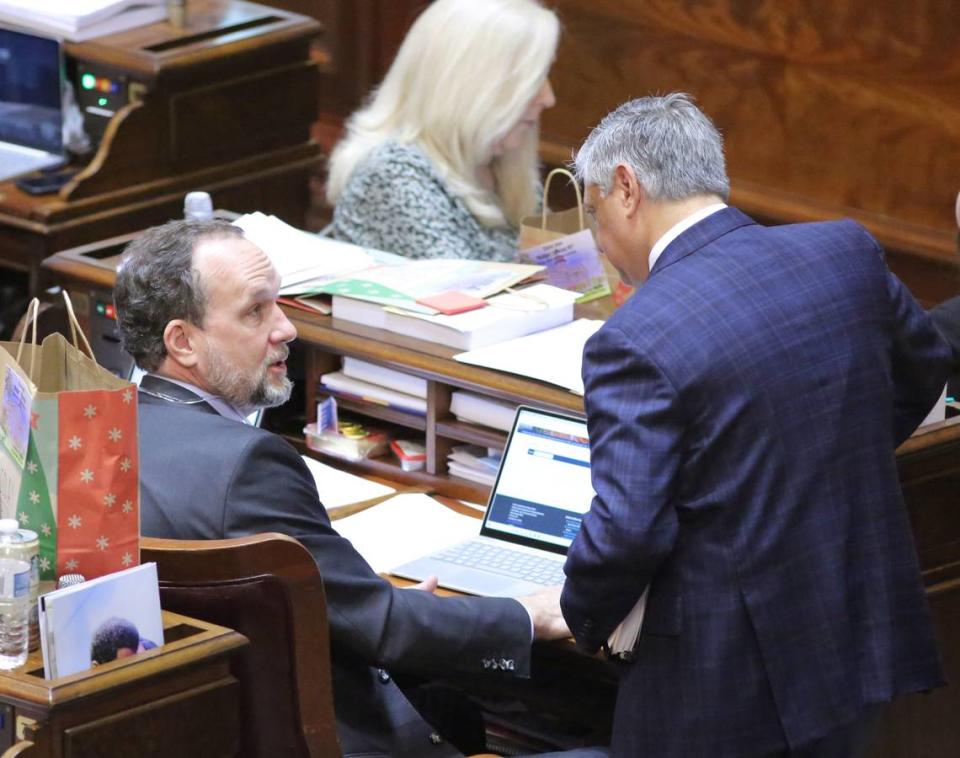SC House OKs budget with teacher, state employee pay hike, property tax cut. Here’s how much
After hours of discussing whether more money should go to bridges or whether to go forward with leases for a new health care agency campus, House members approved a $13.2 billion spending plan, sending it to the Senate for its consideration.
The budget includes raises for state employees and teachers, money for bridges, a $500 million property tax relief for a year and money for freezing college tuition.
But much of the debate was bogged down over what was the correct use of money and whether an expenditure is a core function of government.
Although House members overall stuck with the spending plan brought forward by the Ways and Means Committee, members of the House Freedom Caucus tried to make changes during the two-day debate in order to send more money to the Department of Transportation for bridge work and more money for sheriff’s deputies.
Efforts by the Freedom Caucus failed on the floor.
“It’s disappointing to hear people say we’re not taking care of law enforcement when (SLED Chieff Mark) Keel would tell you that the investments we made in the state law enforcement agencies has been transformative for this state,” said House Ways and Means Chairman Bruce Bannister, R-Greenville. “When we do that all the other municipalities and counties have to follow suit and they’re doing that across the board.”
One of the moves included trying to deny additional money for the S.C. Arts Commission, as conservative Freedom Caucus members argued it wasn’t a core function of government.
“I also want to point out the priorities,” said state Rep. Adam Morgan, R-Greenville, who chairs the Freedom Caucus. “We clearly gave a pathway to increase law enforcement pay and the Republicans rejected that and chose to go with spending for gummy bear statues and for pet projects. And I think that’s unfortunate.”
State Rep. Roger Kirby, D-Florence, defended the Arts Commission saying arts provided $14 billion economic impact on the state and $360 million in tax revenue to the state.
“The arts play such an important role in our society,” Kirby said.
Freedom Caucus members wanted to stop money for a lease for the new planned health care campus on Otarre Parkway in Cayce.
“It’s never going to be cheaper to lease a new building and pay all the maintenance costs for that building .... versus repairing the buildings you are already in,” said state Rep. Jordan Pace, R-Berkeley.

House leadership defended the plan to move agencies out of state-owned facilities on Bull Street onto one campus on Otarre Parkway, into a building Republican donor Bill Stern plans to purchase.
“South Carolina has hundreds of millions of dollars of unfunded liabilities for maintenance of buildings,” pointing to how the department of education and department of natural resources moving into new locations as lease rates have come down,“ said House Speaker Murrell Smith. “I think you’re gonna see more and more of that. And that’s been at the at the working with the department administration trying to find the most cost efficient way to house government.”
Bannister defended the budget saying the House focused on core functions of government, such as bridges infrastructure and law enforcement and education.
“We’ve got a lot of bridges that are old. None of those are going to get to the point that they collapse,” Bannister said. “That’s the D.O.T‘s commitment to us and we’ve made the investment we’ve done what they asked us to do by putting the dollars in and they need this coming year to meet those needs.”
The $13.2 billion spending plan adopted by the House is smaller than the $13.8 billion budget passed last year, which is a product of having less new money to allocate than in previous years.
Despite that, Freedom Caucus members argued for zero-based budgeting.
“We’re looking at their FTEs every year, we’re looking at what their core function is, and what they’re supposed to be doing with their budget and looking for where there’s deficiencies. Do you zero amount and then add all the money back in?” Bannister said. “We don’t do that. But we do look at what they have and determine what they need going forward. So the idea that we don’t look at the base budget at all, it’s just not true.”

Democratic members argued to spend $3 million to allow the state to participate in a federal summer feeding programin the future for children that would provide EBT cards to low income families.
Gov. Henry McMaster declined to participate in the program.
“In my opinion it is a core function of government” said state Rep. Marvin Pendarvis, D-Charleston.
The idea was shot down on the floor as state Rep. Bill Whitmire, R-Oconee, pointed to the Department of Education’s summer feeding program, which is federally funded.
“We do have programs in place now,” Whitmire said.
The spending plan includes $500 million in one-time property tax relief, $230 million to raise teacher salaries including bringing the starting salary for teachers in the state to $47,000 from $42,500 a year and extend the salary schedule to 28 years.
Much of the raise is aimed at teachers who are in the first five years of their career as a way to encourage them to stay in the profession amid a growing teacher shortage.
House budget writers also approved a $1,000 or 1.5% pay raise for state employees, whichever is greater, which will cost the state about $41 million. The House budget also includes $107 million to cover the increased premium costs for those on the state’s health insurance plan.
The House budget also calls for a one-time $500 million property tax cut using surplus sales tax revenue. Budget writers hope to continue the tax relief next year. Money for the tax cut has been accumulating since 2020. The relief will be noted in October tax bills, for payments due in January 2025.
Budget writers also included $30 million for the state’s educational scholarship program, which allows students use up to $6,000 a year toward a private school or attend another public school. A lawsuit to stop the program is in front of the state Supreme Court.
The House also spend an additional $103 million on increased Medicaid costs in the state.
The Department of Transportation also would receive $200 million to spend on bridges.
Lawmakers also want to spend $3 million on an outside audit of $1.8 billion that has been sitting in a flow through account at the Treasurer’s office as officials don’t know which agencies if any the money belongs to. To comply with the audit, the Treasurer’s office would receive $1.2 million for the audit, an addition made on the House floor.


